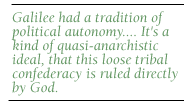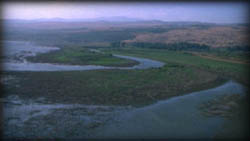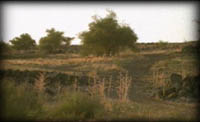Galilee
While often portrayed as a bucolic backwater, the Galilee was known for political unrest, banditry, and tax revolts.Associate Professor of New Testament, Harvard Divinity School
THE POLITICAL CLIMATE OF GALILEE
 What kind of place was Galilee at the time of Jesus? Was it a quiet, rustic,
peaceful little tranquil place?
What kind of place was Galilee at the time of Jesus? Was it a quiet, rustic,
peaceful little tranquil place?
It looks that way, sure. But the region was known for being a hotbed of political activity and some of it violent. Now I want to nuance that a bit; especially in the last few generations of New Testament scholarship, Galilee has gotten this this reputation for being the hotbed of radicalism, the '60s Berkeley of Palestine or something. But in historical context that region was always a contested region.... From very early times... there were always a mixture of peoples in the northern region of Palestine, especially when one moves to the coast....
 Galilee had a tradition of political autonomy. The northern traditions that go into the Hebrew Bible are informed by this political sensibility of autonomy. It's a kind of quasi-anarchistic ideal, that this loose tribal confederacy is ruled directly by God. And those ideas and that ideal continues to be alive and well in northern Palestine. Now some scholars argue about this, but I think we can trace a line from the historical moment that's depicted in the Book of Judges, not when the Book of Judges was written necessarily but the kind of historical moment that it purports to depict, through the cycle of Elijah and the Elijah traditions, 1st Kings, that talk about King making and King breaking, all the way down to Jesus' time. Not necessarily an unbroken line, but a centuries old tradition of political autonomy under the God of Israel. And so this makes foreign imperialism a very problematic proposition in northern Palestine. Because people, I think, have almost a collective consciousness of this ancient Israelite ideal. Not shared by all Israelites, not all over Palestine. But I think a very good case can be made for reconstructing this consciousness in the north. And I think that's the major element by which we can explain the unusual political restiveness in northern Palestine, in the area of Galilee.
Galilee had a tradition of political autonomy. The northern traditions that go into the Hebrew Bible are informed by this political sensibility of autonomy. It's a kind of quasi-anarchistic ideal, that this loose tribal confederacy is ruled directly by God. And those ideas and that ideal continues to be alive and well in northern Palestine. Now some scholars argue about this, but I think we can trace a line from the historical moment that's depicted in the Book of Judges, not when the Book of Judges was written necessarily but the kind of historical moment that it purports to depict, through the cycle of Elijah and the Elijah traditions, 1st Kings, that talk about King making and King breaking, all the way down to Jesus' time. Not necessarily an unbroken line, but a centuries old tradition of political autonomy under the God of Israel. And so this makes foreign imperialism a very problematic proposition in northern Palestine. Because people, I think, have almost a collective consciousness of this ancient Israelite ideal. Not shared by all Israelites, not all over Palestine. But I think a very good case can be made for reconstructing this consciousness in the north. And I think that's the major element by which we can explain the unusual political restiveness in northern Palestine, in the area of Galilee.
And how did it manifest itself?
This word bandit is very problematic. It has all kinds of pejorative connotations in English. And one man's banditry may be another man's terrorism. And it's difficult to tell under certain economic and political conditions where banditry as we usually define it leaves off and where terrorism begins. If you're just rolling people on the highway, I mean that's banditry, as most people define it. But if you're robbing from the rich to give to the poor, that's not quite banditry. Or at least that's banditry with a political edge to it, that means it just can't be dismissed as a problem of law and order per se. And I think this is the difficulty that we enter when we try to historically reconstruct what was going on there. I mean some people were engaged in violent resistance against the status quo and that means under this regime, as most, certain kinds of lawbreaking.
So what the Romans or the authorities might have defined as lawbreaking might have had a social or political content to it?
I think the Romans were perhaps even more astute than many scholars and historians after the fact.... Josephus, the Jewish historian, tells us a number of stories about characters whose career could be crudely summarized as [the] following: some guy wakes up in the morning and he thinks he's the Messiah or something. Or he's a prophet and he gets a group of people to follow him. He says we're going to go out in the desert and we're going to an empty place. We're going to go out there and we're going to wait for God to do something for us. So a whole bunch of people may go with him, maybe thousands, go with him out to this deserted, unsecured place, and they wait for what Josephus calls "the tokens of their deliverance." And the Romans send a vicious police action out there and kill everybody.
Now I think it's important for us to understand the political logic at work. When that kind of police action is perpetrated against what we might consider harmless fanatics, the Romans are really giving us a very good historical lesson in how domination works. They didn't honor the right of assembly, as we might call it, in the provinces. Any group of people that large, even if they were out there for a picnic, constituted a threat to Roman security, and the Romans responded accordingly....
And I think that Josephus has a number of motivations for telling us this, but one of Josephus' motivations and one of his apologia for these stories, ostensibly, is that he wants to show that there were a bunch of fanatics in Palestine who were running around causing trouble, whipping up the local yokels. And that these people were irresponsible and they weren't representative. And that the Romans could deal with them and dispatch them quickly. Josephus' point is that they are fanatics; they're not responsible people. They're not people, for example, like Josephus.
Professor of Religion and Archaeology Duke University
THE GALILEE
The Galilee, which becomes the true locus for a good deal of Jesus' ministry and which is the heart and soul of Jewish learning from the first and second century onwards..., is one of the most beautiful landscapes of the entire Middle East region. And we can divide it easily because there are only three major trans-Galilean routes that link it east-west and only several roads that go north-south. The great Jordan rift, of course, is the major north-south dividing line, and that goes all the way up to Mount Hermon in the northeastern corner of the land of Israel, and that is the north, the northernmost border of Galilee. The major east-west route that divides upper Galilee from the lower Galilee runs from Haifa/Acco, ancient Ptolemais in this period, over to Capernaum, over by the western shore of the Sea of Galilee. And there is a Roman road there that separates north and south, upper from lower Galilee at the Beth Ha- Kerem Valley, and Josephus is very explicit to tell us about the two Galilees.
 The upper Galilee has no cities in it. It's rural, it's remote. It's located in the highest hills of the land of Israel..., a very remote area along the borders and frontiers of modern Lebanon, and high mountains and very, very treacherous terrain, very isolated by reason of topography and the nature of the land itself.
The upper Galilee has no cities in it. It's rural, it's remote. It's located in the highest hills of the land of Israel..., a very remote area along the borders and frontiers of modern Lebanon, and high mountains and very, very treacherous terrain, very isolated by reason of topography and the nature of the land itself.
Coming down from this first trans-Galilean route, Capernaum, Acco, roughly going across the map, down south you get to the gentle lower hills of lower Galilee. And this is an area that has two cities: Sepphoris and Tiberius, both founded by Herod Antipas. Tiberius he founded anew, the only city founded de novo in the first century. And they become the anchors of the Jewish population of the Galilee, and really a lot of activities that we associate with all the important events of the first century can be located in them. One of the most significant differences between the upper Galilee, the more remote area to the extreme north, and the lower Galilee, which borders the Sea of Galilee on the east, and the Mediterranean Ocean on the west, aside from the topography, is that in the north, the people were speaking Aramaic and Hebrew and in the south, both Aramaic and Hebrew but a lot of Greek. In addition, there was a much more lenient attitude towards the second commandment, towards making images and decoration in the south, than in the north. In the north, we get candelabra, minarot, and we get other symbols, but we don't get pictorial symbols as we find them so much in the south.
These two Galilees certainly give a picture in miniature of the diversity that we find in Roman period Judaism of that time. Surely the north of Israel was more conservative and lower Galilee less conservative and more open to change, and that is reflected by the road system and all the other traffic that's going on there.
Professor of Classics and Director of the Religious Studies Program University of Texas at AustinPOLITICS OF GALILEE
Galilee, throughout the time of Jesus, was ruled by one of Herod's sons. So it was ruled much as his father's kingdom had been, as a kind of small client kingdom. This means that local politics in Jesus' home region were a little different than those in Judea under the Roman Governors.
...In a client kingdom, the King, himself, is the absolute overlord. He's given a lot of freedom by Romans, insofar as all he has to do, basically, is raise his own taxes. And then he's in charge of everything else. So the control of the north was, in some ways, more independent, and indeed the trade and commerce that we see in this northern region shows us the degree to which the intersection of the different cultures of the north were really starting to become very important in the developing life of that region.
People use the word Galilean in a special way. What was the connotation of being a so-called Galilean?
The term Galilean seems to have been used in a variety of ways in this period. To some, it just might mean an outsider, or someone who's not really an old Jew of the traditional sort. Precisely because the Galilee had traditionally not been Jewish at the time of the Maccabean Revolt a hundred or 150 years before Jesus. But from another perspective, "Galilean" also took on the coloration of being rebellious, or insurrectionist. Precisely because we know of some people in that region who resisted first, Herod's rule, and then that of his sons and the Romans themselves. So for some, the term Galilean might also mean something political.
POLITICAL UPSTARTS AND THE ROMAN RESPONSE
Social dissent?
... Because of its position away from Jerusalem, Galilee may have become a center of, not only social dissent, but economic protest. There seems to be a rise of what we might describe as social banditry. One of the most famous characters this sort is a fellow by the name of Judas the Galilean.
What happened to him?
Judas the Galilean, himself, was eventually captured and executed by Herod's sons, but his own family continued his tradition. We hear of two more of his sons in the mid-40's A.D. who were captured and crucified by the Roman Governor, Tiberius Julius Alexander. This is kind of an ironic story. Here is this ongoing tradition of protest against Roman rule, but the Governor, himself, Tiberius Julius Alexander, is actually a Jew by birth. He is the nephew of Philo, the Jewish philosopher of Alexandria. And yet, he's the one who orders them executed because of their political rebellion.
[Who was] The Egyptian?
We hear of a number of other characters during this period who reflect this growing social banditry and political protest. One of the most interesting, and famous cases is a character known as The Egyptian. We don't know his real name. He seems just to have come from Egypt. But according to Josephus, he's someone who had magical powers and garnered an enormous following among the popular folk. It seems that at one point he led a mass of people up on the Mount of Olives, literally looking down into the Temple from across the way. And Josephus says that as a kind of false prophet ... and that's Josephus' favorite way of putting it ... as a kind of false prophet, this Egyptian promised them that he would lead these common people into Jerusalem, to take the Temple. They would make him their King, and they would, in turn, become his royal honor guard.
And what happened to him?
Well, the Romans have a fairly standard response to this kind of individual. They immediately dispatch the cavalry, and any support units of the military that are at hand. Their response is quick and certain. Go first for the leader, and disperse the rest. The leader is usually arrested, or executed on the spot. The rest of the mob, as they appeared to be to the Romans, would have been dispersed, in some cases with a great deal of brutality.
Is that what they did to the Egyptian?
The Egyptian seems to have escaped in this case. Most others did not. And so, the Egyptian is a kind of a namesake of someone who lives on in the memory for a number of years, precisely because he wasn't executed.
